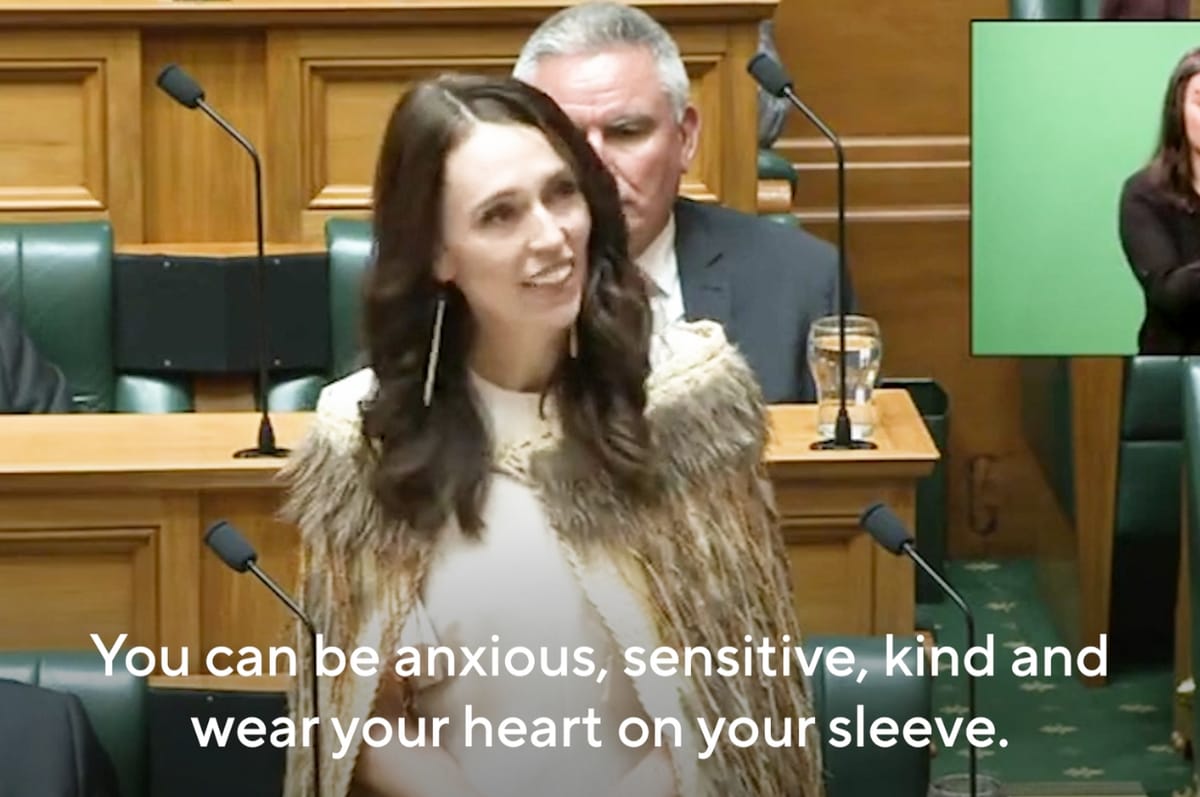Ex-New Zealand Prime Minister Jacinda Ardern Gave A Moving Farewell Speech On Her Last Day In Parliament
“You can be anxious, sensitive, kind and wear your heart on your sleeve… and not only can you be here, you can lead. Just like me.”

Former New Zealand prime minister Jacinda Ardern delivered a moving farewell speech on her last day in parliament, cementing her legacy as one of the country’s most iconic leaders.
The 42-year-old made the surprise announcement that she was resigning in January after five and a half years in the role.
In a wide-ranging, emotional speech on Wednesday April 5, Ardern spoke about her time as prime minister, the challenges and the accomplishments she was proud of, encouraging others to pursue a career in politics and leadership.
She spoke about the reasons why she joined politics – to fight climate change, child poverty and inequality – and how her term became known for a different list, which included a domestic terror attack, a volcanic eruption and a pandemic.
She talked about the things she was proud of accomplishing with the Labour government, including the growth of the Te Reo Māori language, teaching of New Zealand history in schools, and the creation of Matariki, New Zealand’s first Indigenous public holiday.
“The path we travel as a nation will not be linear, and it won’t always be easy. But for the part of the trail that I had the privilege of leading, I’m proud we took on the hilly bits,” she said.
“Politics has never been a tick list for me. It’s always been about progress. Sometimes you can measure it, and sometimes you can’t,” she said.
“We won’t ever know the long term benefits of banning conversion therapy, especially for our young people. Or what it means to our Pacific communities that we finally apologised for the dawn raids. There will be no list of the lives saved because of the banning of military style semi-automatic weapons. We won’t know how we left woman feeling about the ability to make their own choices when this parliament decriminalised abortion, or when we improved pay equity, put period products into schools, or reached 50% representation of women in parliament,” Ardern added.
She also discussed the difficulties of navigating the COVID-19 pandemic and how moments like the Christchurch terrorist attack left her bereft.
She shared the behind-the-scenes story of a widely shared image of her captured the day after the attack.
“We had brought together a group of politicians to travel to Christchurch and the Defence Force carried us. On the way down I had seen the front page of the paper and the image of a member of the Muslim community covered in blood in the aftermath of the attack. It was a devastating picture,” she said.
“As we arrived at the meeting venue in Christchurch we were greeted by a range of community members. Sitting in the front row, was the same person who only hours before had been photographed. As he stood to speak, I did not know what to expect, but what came next was one of the most profound memories I have of that period. He thanked us. Here was someone who had been through the most horrific experience I could imagine, and he thanked New Zealand and expressed gratitude for his home,” she said, adding that the nation must work to live up to the expectations that those who experienced the terrorist attack have in order to deserve their thanks.
“To the Muslim community of Aotearoa New Zealand, you have humbled me beyond words. Assalaam Alaikum,” she added.
She conclude her speech by talking about why she decided to join politics and leadership and why others should.
Discussing her humble beginnings, she detailed how she had been a worrier, sensitive, a crier and a hugger, and how she thought she would have to change dramatically in order to survive as a politician.
“I didn’t change. I leave this place as sensitive as I ever was. Prone to dwell on the negative. Hating Question Time so deeply that I would struggle most days to eat beforehand. And I am here to tell you, you can be that person, and be here,” she said.
She also spoke about being a mother, candidly speaking about the challenges she had faced as a woman politician looking to have children, as well as the struggles of getting pregnant through IVF.
I cannot determine what will define my time in this place. But I do hope I have demonstrated something else entirely,” she concluded. “That you can be anxious, sensitive, kind and wear your heart on your sleeve. You can be a mother, or not, an ex-Mormon, or not, a nerd, a crier, a hugger – you can be all of these things, and not only can you be here – you can lead.”
Ardern received a standing ovation from parliament.
Her fiancé, Clarke Gayford, and daughter Neve, were also present, watching from the gallery.
Ardern will now take on a new role working to work on the issue of radicalisation and violent extremism online with international governments and social media companies.
Current New Zealand prime minister Chris Hipkins appointed Ardern as special envoy for the Christchurch Call, a project Ardern created after the Christchurch terrorist attack on March 15, 2019, when a terrorist opened fire in two mosques and killed 51 people.
The project is a community of over 120 governments, online service providers and civil society organisations that are acting together to eliminate terrorist and violent extremist content online.





